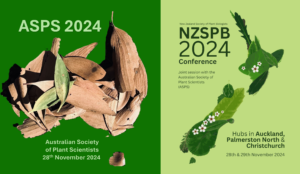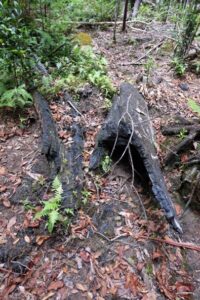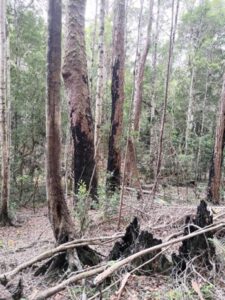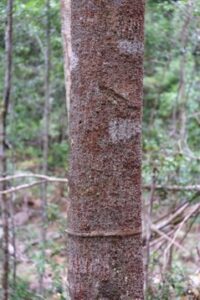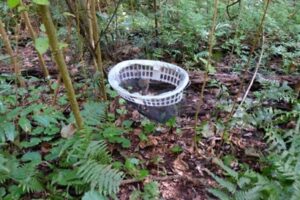Welcome to the November 2024 edition of Phytogen!
Our annual ASPS conference, incorporating the NZSPB conference is just around the corner! Registrations are still open for the conference and dinner. You can join in the conversation on the day on X using #asps2024. The ASPS Annual General Meeting will be held online on 29th November 2024.
This issue we highlight the other ASPS winners who will be presenting at the conference – Peter Crisp (Peter Goldacre Award), Ashley Jones & Benjamin Schwessinger (Outreach and Education winners), and Sergey Shabala (JG Wood Lecture). We also have a contribution from Dr. Kristine Crous, our Environmental & Ecophysiology Representative, and student contribution from Arka Dutta, PhD student at La Trobe University.
Expression of Interest are still open to be part of ASPS as council members and discipline reps.
We welcome contributions from students and researcher at any time for publication in Phytogen. Its free and a great way to give your research profile a boost and share your findings! Send your contribution to our editors Razlin (razlin.azman@csiro.au) or Lucas (L.Auroux@latrobe.edu.au).
2024 ASPS Award Winner Spotlight: Peter Goldacre Award
School of Agriculture and Food Sustainability, Faculty of Science, University of Queensland & Centre for Crop Science, Queensland Alliance for Agriculture and Food Innovation
Academic profile: UQ Profile
Lab webpage: Crsip lab
Social media (X): @Pete_crisp
Google Scholar: Peter Crisp
Dr Peter Crisp is a Group Leader and Senior Lecturer in the School of Agriculture and Food Sustainability at The University of Queensland. Peter’s research program is focused on crop functional genomics, epigenetics and biotechnology, and has significantly advanced our understanding of the contribution of epigenetics to heritable phenotypic variation in plants. His group has invented groundbreaking technologies for harnessing (epi)genetic variation and their discoveries have led to exciting new avenues for decoding genomes and for the rational engineering of gene regulation for trait improvement in plants. Having benefited immensely from brilliant mentors, Peter is passionate about training. He leads a budding group of talented students and researchers and is a Chief Investigator in the ARC Training Centre in Predictive Breeding and the International Research Training Group for Accelerating Crop Genetic Gain. Peter is also an affiliate of the Queensland Alliance for Agriculture and Food Innovation and the ARC Centre of Excellence for Plant Success in Nature and Agriculture.
Peter completed his PhD in functional genomics and intracellular signalling at the Australian National University under the supervision of Prof Barry Pogson; then from 2017 was a Postdoctoral Fellow at the University of Minnesota, USA under the mentorship of Prof Nathan Springer working on epigenomics in maize. Peter joined UQ in 2020 as a Group Leader and Lecturer Crop Biotechnology and genomics in the School of Agriculture and Food Science in the Plant Science cluster. At UQ Peter also held an ARC DECRA Fellowship followed by a UQ Amplify Fellowship.
2024 ASPS Award Winner Spotlight: Education and Outreach Award
Dr Ashley Jones
Research School of Biology, Australian National University
Academic profile: ANU Profile
Social media (X): @dnawhisperer
Ashley is a research scientist at the Australian National University, specialising in genomics and molecular biology. Key research areas are genome structure, transcriptomics, long non-coding RNAs, nucleic acid sequencing, SARS-CoV-2, bioinformatics and evolutionary biology.
Research School of Biology & ARC Training Centre for Future Crops Development
Australian National University
Academic profile: ANU Profile
Lab webpage: Schwessinger Lab page
Google Scholar: Benjamin Schwessinger
Benjamin has been working on plants and fungi in various aspects from signalling to genomics and from biochemistry to bioinformatics. He started off with Arabidopsis before moving to rice and Xanthomonas. His current work is focused on fungi called rusts with a focal point on the wheat stripe rust fungus Puccinia striiforims f. sp. tritici. Benjamin is fascinated by biology in general and by observing living systems in interaction.
Over the past seven years, Ashley and Benjamin have continuously innovated their teaching of the latest genomic analysis approaches in plant sciences, spearheading the establishment of Oxford Nanopore sequencing across Australia and in the class room. Their impact in plant science teaching and beyond has been significant, influencing multiple sectors including universities, industries, government, and communities. Key to these achievements, is that they pursue a highly integrative approach to teaching from wet lab protocol development to dry lab analysis pipeline sharing. In addition, we focus on development of wider scientific communities, as we share teaching materials and protocols online via Protocols.io.
2024 ASPS Award Winner Spotlight: JG Wood Lecture
School of Biological Sciences, University of Western Australia
Academic profile: UWA Profile
Google Scholar: Sergey Shabala
Sergey is the Chair in Plant Physiology at the University of Western Australia. He is also a Distinguished Professor and a Director of the International Research Centre for Environmental Membrane Biology at Foshan University in China. His area of expertise is stress physiology and membrane transport in plants. His work is aimed at revealing and quantifying the role of specific ion transporters in plant adaptive responses to salinity, waterlogging, osmotic stress, chilling, acidity, elicitors and oxidative stress, as well as to understand the signalling cascades mediating plant-environment interactions. Professor Shabala revolutionised the once mysterious field of plant stress biology by introducing and applying ‘MIFE’, a trademarked non-invasive tool for studying the adaptive responses of plant cells and tissues to a large number of stresses.
Be part of ASPS!
Nominations are now accepted for the following positions in ASPS. You can nominate using this form ASPS-Council-Nomination-Form-5, and send to Janet Wheeler (Janet.Wheeler@latrobe.edu.au). The positions will remain open until filled.
- ASPS secretary
- Education and Outreach
- Diversity and Inclusion
- Student representative
Discipline leads:
- Cell Biology Representative
- Plant-Microbe Interactions Representative
Environmental & Ecophysiology Representative
Institute for Molecular Bioscience, Hawkesbury Institute for the Environment
Western Sydney University
Academic profile: Western Sydney Uni profile
Lab webpage: Crous Lab
Google Scholar: Kristine Crous
The 2019-2020 bushfire season was one of the worst in history with about 24 million hectares burnt across the country. This bushfire season was preceded by a strong drought lasting for several years and resulting in crisp, dry leaves underfoot in the forest, even in rainforests. We now call this season the “Tinderbox drought” as the long drought prepared many landscapes for easy ignition, including in rainforests.
Rainforests usually don’t burn due to high moisture levels, but large parts of world heritage-listed Gondwanan rainforests did in 2019-2020. This event opened up a unique opportunity for researchers to investigate how resilient rainforests are to bushfire. After the initial resprouting and reseeding phase, there was cautious optimism that rainforest were moving on and recovering. However, these rainforests did not evolve with fire and have thin bark.
My team at Western Sydney University set up a contrast of control (no burn) and burned plots in Northern NSW three years after the fires to investigate the longer-term effects of bushfire on rainforest species. These plots are rich and diverse in species, including both the foundation species as well as some threatened species. Many of these rainforest species have ancient Gondwanan lineages, going back 40-50 million years to the time when Australia broke off from Antarctica. Rainforest species responses to fire include resprouting, re-seeding, and mortality, with overall slower recovery rates compared to other ecological communities (e.g. eucalypt-dominated forests).
Even five years after the fire, there is a vast contrast between burned and control plots. Charcoal on the stems reveal the scars of the burn (Fig. 1) and the open canopy of the burned plots makes you feel exposed to the sun, unusual in normally closed-canopy rainforests. Some trees have no leaves at all, exposed cracks in their bark or show signs of fungal attack on their stems (Fig. 2). These are signs of a slow death. Trees are still dying years after the burn with stem fall regularly occurring.
Fig 1 (L: Charcoal traces on fallen trunk in the aftermath of fires; R: Fire scars left behind. Photo credits: Amy Smart)
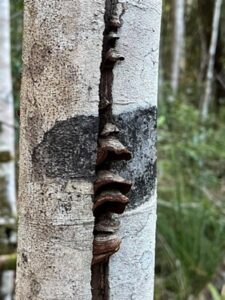 Fig 2: Fungal attack after fire (photo credit: David Ellsworth).
Fig 2: Fungal attack after fire (photo credit: David Ellsworth).
The capacity to recover ecosystem productivity and reinstate nutrient cycling is important to the overall long-term resilience of rainforests. Our team is monitoring aboveground productivity in burned and control plots. This involves stem growth via dendrometer bands (Fig. 3), leaf canopy increment via canopy photos and leaf litter fall (Fig. 4) as a turnover component. Nutrient dynamics are also contrasted in burned and control plots including nutrient resorption and soil nutrients to investigate how nutrients influence rainforest recovery after fire. Plant traits such as bark thickness, vulnerability to embolism and heat tolerance are also measured. While initial green resprouting may have been seen as ‘recovery’, bushfires may push rainforests to an alternative vegetation type and eliminate habitat for threatened and endangered species. It is clear that this ecosystem still has a long trajectory towards restoring what was here before with ongoing impacts even five years after fire.
This project is still ongoing and funded by the Hermon Slade Foundation. We are hoping to gain insights into recovery trajectory of rainforests after fire on two different soil types. A deeper understanding of post-fire responses and aboveground productivity is crucial to assess the long-term resilience and recovery of rainforest species and improve biodiversity conservation strategies after fire.
(L)Fig 3 Dendrometer band on tree, photo credit: Amy Smart; (R) Fig 4: Leaf litter trap in the woods, photo credit: Amy Smart
Student Contribution
Arka Dutta
PhD candidate, La Trobe Institute for Sustainable Agriculture and Food (LISAF – AgriBio research centre)
Department of Animal, Plant and Soil Sciences, School of Agriculture, Biomedicine and Environment, La Trobe University
Academic profile: Arka Dutta profile | La Trobe University
Motivated by an intrinsic curiosity, Arka Dutta’s research path has led him internationally to La Trobe University, where he is currently a 2nd year PhD student. “As a child, I was enormously influenced by Madam Curie and Rosalind Franklin’s biographies, and wanted to pursue a career in fundamental science. Growing up, I spent a considerable time with my father, a mathematics professor who inadvertently drew me into the field ofscience. Tackling one problem through multiple approaches and arriving at a conclusion with robust scientific reasoning was what I liked the most about doing science.
Throughout my entire academic career, I had the opportunity to carry out internships in different laboratories and I realized that performing experiments, troubleshooting them, and asking logical questions in a meaningful way is a passion more than anything”.
“My key scientific interest lies in understanding the intricate networks in plants that regulate nutrient uptake, utilization, and reallocation, with the goal of engineering crops to enhance their nutritional immunity and resilience against diverse stress conditions”
Arka’s PhD research question focuses on understanding the adaptive strategies plant use to modulate the cellular phosphate sensors (SPXs) proteins, to regulate the homeostasis of phosphate and nitrate signalling in plants.
During his PhD, Arka had the opportunity to be a co-author in some of the most renowned peer-reviewed plant Journals. Here is a budding list of publication from Arka, that highlights his research contributions:
Balancing act: The dynamic relationship between nutrient availability and plant defence
The Plant Journal (2024)
DOI: https://doi.org/10.1111/tpj.17098
The fnr-like mutants confer isoxaben tolerance by initiating mitochondrial retrograde signalling
Plant Biotechnology Journal12 pages Wiley-Blackwell
DOI: 10.1111/pbi.14421
Phosphate starvation regulates cellulose synthesis to modify root growth
Plant Physiology194(2):1204-1217 (14 pages) Oxford University Press
Editors’ note
Phytogen will be back for our next issue for the 2024 ASPS conference wrap up
We look forward to see you all in person and online for the conference.

